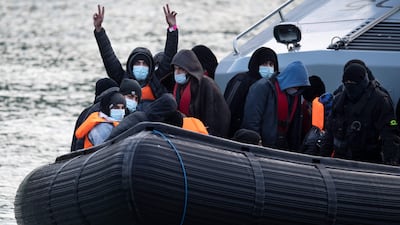Rights groups have called plans by the UK Home Office to electronically tag people who cross the Channel in small boats “cruel” and “desperate”.
The head of the Refugee Council, Enver Solomon, said: “Reports today of plans to tag and curfew people seeking asylum of working age smack of desperation from a government that doesn’t know how to manage our asylum system in an orderly, effective and, most importantly, humane way.
“Treating innocent men, women and young adults who have fled war and persecution like criminals is cruel, draconian and punitive that sets a new and unprecedented low in the UK’s approach to responding to people in desperate need. It won’t act as a deterrent nor stop people making dangerous journeys across the Channel. Instead the government needs to create more safe routes for people and ensure everybody who reaches our shores is treated with humanity and given a fair hearing on UK soil.”
The proposal to tag people who are claiming asylum was first reported in The Sun newspaper, which cited sources that claimed Britain already had legislation in place to allow it.
The Home Office declined to comment on the tagging plan but referred journalists to a comment from immigration minister Tom Pursglove, who said: “The Nationality and Borders Bill will make it a criminal offence to knowingly arrive in the UK illegally and introduce life sentences for those who facilitate illegal entry.”
Home Secretary Priti Patel has made a drastic overhaul of the immigration system the calling card of her post, most notably through the Borders bill which is currently passing through parliament.
Reducing so-called “pull factors” to the UK is another method ministers have considered.
Tagging people who make their way through the British asylum system would make it harder for them to work illegally while their claims are being considered, a process that can take up to several years. Migrant rights’ activists have repeatedly campaigned to allow asylum seekers to work instead of relying on government subsistence.
Under Ms Patel’s “new plan for immigration,” linked to the Borders Bill, the Home Office wants to house all asylum seekers in reception centres instead of hotels, and according to news reports, tagging may be part of this process.
Minnie Rahman, the interim chief executive of the Joint Council for the Welfare of Immigrants, said: “The government seems bent on pursuing ever more desperate and draconian measures like electronic tags, which are disproportionate and aimed at solving a problem that simply does not exist.
Last month the Home Office said that only five people who had crossde the Channel on small boats had been returned to Europe this year.
More than 27,000 people have arrived in the UK this year by crossing the Channel on small boats, up from 8,500 in 2020.
In November, 27 people drowned in the worst loss of life in recent migrant drownings when the flimsy boat they were on deflated.
The tragedy prompted the condemnation and arrests of traffickers who have been blamed my various governments for exacerbating the migrant flow across Europe and to the UK.
Britain also came under pressure to open legal migration routes as an alternative to the dangerous boat crossings.
A new UK Resettlement Scheme, which started in February 2021, works with the UNHCR to identify refugees around the world for relocation to the UK. According to the Home Office, 345 refugees were resettled between January and March 2021 across all resettlement schemes.
On Thursday, the government confirmed that the new Afghan Citizens Resettlement Scheme (ACRS), set to take in up to 20,000 Afghans over five years, would open in January.
The UK in August flew 12,000 Afghan nationals to Britain who had worked with British forces or the government after the fall of Kabul to the Taliban.


